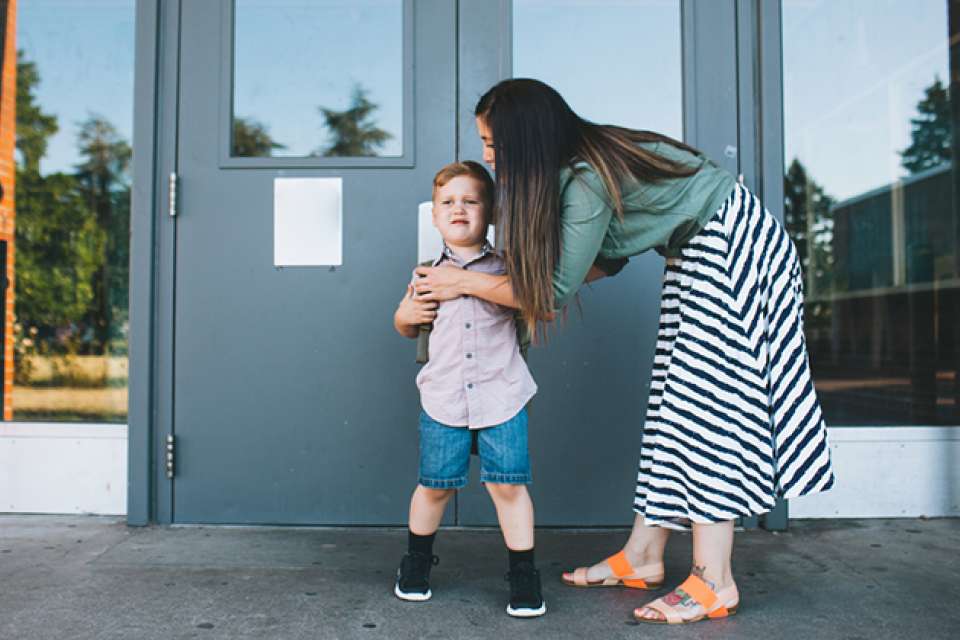Does Your Child Have Back to School Nerves or Is It an Anxiety Disorder?

For most kids, back to school time is about deciding what to wear on the first day of school, making sure their backpack is fully stocked, and looking forward to seeing their friends every day. But back to school isn’t so exciting for everyone, especially children with an anxiety disorder, including generalized anxiety disorder, panic disorder and social anxiety disorder.
The symptoms of anxiety disorders in children are sometimes different than in adults, says clinical psychologist Kari Astley Stephens, Ph.D. Here’s how to tell if your child has normal back to school jitters—or if their behavior may be a sign of a disorder that should be addressed by a professional.
Their nerves don’t seem age appropriate
A kindergartener coming into school should be really nervous, says Stephens. In fact, some schools even accommodate for this by giving kids a practice week before the school year starts, or having the kindergarteners come in a little late on the first day so they don’t have to walk in with all the big kids.
But older kids shouldn’t feel as nervous, so be mindful of your older kids’ reactions in the days leading up to the first day of school. That said, every year is a transition, and feeling a little nervous to go to school is normal at any age, Stephens says. But you should notice it gets easier within the first few weeks of school starting.
“What if?” is the question of the month
What if you get in a lot of traffic and can’t pick me up after school and I have to walk home? What if I don’t like the school lunch and I’m hungry all day? What if no one wants to play with me on the playground and I have no friends? If your child is asking lots of “what if” questions in the weeks leading up to the first day and spinning elaborate, stressful scenarios in their head, they might have an anxiety disorder.
“Kids with anxiety are looking for that answer because they’re looking to get the uncertainty to go away,” she says.
As a parent, it might feel reassuring to have all the answers for your child, but it’s better to let them wonder sometimes, says Stephens. Constantly giving in to a child’s questioning—by offering a reassuring answer every time—is what therapists call “collusion.” While you mean well, you’re not helping your child learn to deal with uncertainty and are instead accidentally helping them avoid their fears. Occasionally telling your children you're not sure what will happen will be better for them in the long run, she says.
They seem sleepier than usual
We all feel tired from time to time, but if your child is in bed for an adequate amount of time and is still really sleepy, they might not actually be getting good quality sleep.
“If you notice that your child isn’t sleeping because they’re so anxious that they can’t fall asleep—and if that’s persisting and happening frequently—it could be a sign of an anxiety disorder,” says Stephens.
You can help your child improve his or her sleep by keeping to a consistent bedtime, creating a quiet space and making sure screened devices and other forms of stimulation don’t get in the way of bedtime, she says.
Tummy aches are the new norm
Anxiety triggers the area of your brain responsible for the fight or flight fear response—which can cause your heart to race and your muscles to tighten, says Stephens. That’s why anxiety can bring on such physical symptoms, including stomach aches, sweating, intense shaking and headaches.
Adults can sometimes realize there is an emotional piece driving these feelings, but kids aren’t typically as aware of the mind-body connection and may just think they’re “sick,” explains Stephens. If you let your child stay home from school, he or she may start to feel better, which may reinforce this to happen again.
“One of the worst things for kids with anxiety is to keep them from school,” says Stephens. “It’s really hard to force a kid who doesn’t feel well to go to school, but you don’t want to get into a pattern where they’re sick a lot and stay home and their anxiety gets worse.”
They’re having trouble staying engaged at school
Children who have an anxiety disorder sometimes disengage with their surroundings, especially in a new setting, says Stephens. Take note if your child’s teacher says that he or she is having trouble paying attention in class, won’t participate in group activities or isn’t able to click with the other kids. These can be possible signs of an anxiety disorder.
Talking about school is off limits
Avoiding the subject of school altogether is one way that kids with an anxiety disorder may try to keep their discomfort under control, says Stephens. You might notice your child getting agitated if you try to talk with them about the first day and asking to change the subject.
Very young kids may have a meltdown any time you bring it up and avoid the topic completely. This may not be your child acting up—and could very well be anxiety.
They don’t want to spend time with friends
Is your child turning down playdates, refusing to go to birthday parties or avoiding after-school activities because it’s just too overwhelming? If your child’s anxiety is interfering with social activities, it could be time to seek help, says Stephens.

How to Deal With Anxiety: Helping Your Kid Cope
If your child is struggling with going back to school, let him or her know that you understand it’s a stressful time—and that you’re there for support, says Stephens. You might empathize with your child by acknowledging that you’d be nervous if you were starting a new job, too. Celebrating the day with small rewards and lots of encouragement may also help take the edge off, she says.
If you’re concerned about your child’s behavior, talking with a school counselor is one good option, says Stephens. This can help you work through the issues that teachers may be noticing at school to get a better picture of your child’s behaviors and function issues.
Some primary care clinics have behavioral health resources in the clinic or referral lists that may be helpful for finding child anxiety mental health providers in the community, she says.
“And don’t forget asking other parents you think might have children similarly affected,” Stephens recommends. “Word-of-mouth referrals are often a great way to find a good provider.”
Editor’s note: This article was originally published Sept. 6, 2017. It has been reviewed and updated.

 Healthy ideas for your inbox
Healthy ideas for your inbox





